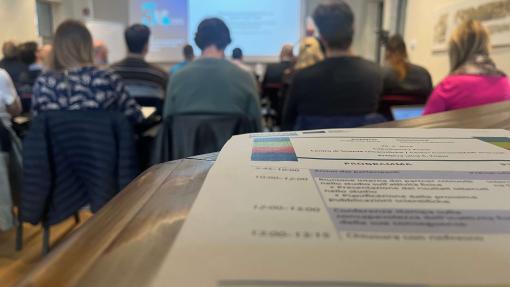On March 29th, 2024, at the Center for Humanities within Science and Research Centre Koper, in collaboration with all project partners of the X-BRAIN.net project, co-financed by the European Union under the Interreg VI-A Italy-Slovenia Programme, an event titled "Physical Inactivity" took place.
The focal point of the event was the presentation of the initial findings of the cross-border project X-BRAIN.net, which the project partners will use in practice for the first time next month.
It is worth noting that one of the goals of the mentioned project is the identification and establishment of the best measures to prevent the negative effects of several days of hospitalization following a stroke. A specific research challenge of the project is to determine the extent to which the lack of physical activity contributes to these consequences in hospitalized patients, which typically lasts between 7 and 10 days.
The study was conducted on a group of subjects aged between 65 and 70 years, who remained in bed for 10 days. The age of the subjects represents the average age of patients who experience an acute cerebrovascular event. For this group of examinees, we simulated the best possible care and assumed that this would mitigate the decline in cognitive and physical functions compared to the group that only laid in bed for 10 days. The examinees had previously spent two months exercising (prehabilitation) to enhance their physical fitness. They took nutritional supplements (proteins) and performed cognitive exercise in a virtual fitness room using a virtual reality system during their lying down period.
The study was successfully concluded, and it was found that multidimensional intervention (prehabilitation, cognitive training, and dietary supplements) largely prevents the negative consequences of physical inactivity, such as muscle atrophy, loss of muscle strength, insulin resistance, cellular stress, and risks of diabetes and cardiovascular diseases.
Next month, recommendations will be implemented in real patients at the hospital in Izola. They will establish a so-called "active room", utilizing advanced science-based rehabilitation protocols, using innovative information and communication technologies, to improve neurocognitive and motoric rehabilitation of stroke patients. The active room is a significant example of how modern scientific knowledge is integrated into medical practice, which will be used and upgraded even after the end of the project, resulting in the sustainability of direct effects and results if the project.
The event concluded with a press conference. You can find the coverage from 9:41 minutes onwards in the following segment by the Slovenian Television, aired on the show Primorska kronika: https://365.rtvslo.si/arhiv/primorska-kronika/175033928.
For more information about the event, you can also read media coverage below:

